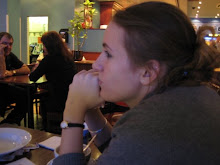This is a bit impersonal, but here's a link to some of my impressions from the Imperial War Museum in London: In Memoriam: The Great War.
During the first four weeks I was here, I took a course called British Landscapes, created especially for SCIO students. It was an amazing class, integrating aspects of history, literature, philosophy, theology, political science, and physical geography. We averaged about two lectures a day, one from dear old Simon Schama, and one from an Oxford guest lecturer -- a specialist in whatever discipline we happened to be studying. We also wrote three intense research papers.
Anyway, getting back to the War Museum, we had a field trip every Thursday, in which every student on our program, as well as professors, would pile into a double-decker bus, and go gallivanting across England. Our last trip was to London's war museum, which happens, ironically, to be hosted in the hospital that used to be called Bedlam. That's right, the insane asylum.
At the time, I was writing a paper on women poets of the world wars, dealing with issues of propaganda and the voices we get (and don't get) to hear. I was deeply impacted (and exhausted) by the sheer volume of death and pain. I walked into an exhibit called The Children's War, and started crying just looking at a wall-sized portrait of a child who lived, and perhaps died, during World War II.
I couldn't even bring myself to enter the Holocaust exhibition.
And through it all, the deep nagging feeling, what are we doing here? Commemorating bombs and steel and awful death. Watching children (there were several school groups present) running and laughing through the exhibits, climbing on the fighter jets (there to be touched and enjoyed), and enthralled by the missiles taking up the center of the atrium. I felt sick, but unable to do anything. Sick that we forget; sick that we pretend it was a game; sick that boys and girls still go off to die in gruesome ways. Sick that 90 years after World War I (the anniversary of the Armistice is the 11th of November) we still don't seem to grasp the horror of war's impact.
* * *
On a slightly different note, World War I is still called the Great War in England. Although I've always been taught about its horrors, the gas and pointless death, the lost generation, etc., World War II has always been the real war in my mind, partially, I think, because of the Holocaust. The Great War, however, had an affect on Europe that, as Americans, I don't think we're ever taught, or fully understand. In our psyche it's simply the prelude -- a war we barely fought. But though everyone here will admit that World War II was awful, it doesn't seem to have had the scarring affect of its predecessor. In some ways, World War I was and is the only war:
Whenever the November sky
Quivers with a bugle's hoarse, sweet cry . . .
I remember,
Not the war I fought in
But the one called Great
Which ended in a sepia November
Four years before my birth.
-Vernon Scannell, from The Great War
Practices for Disturbing Times
4 years ago

2 comments:
"...as Americans, I don't think we're ever taught, or fully understand. In our psyche it's simply the prelude -- a war we barely fought."
Bethel University's HISTORY DEPARTMENT offers an interim course on World War I (it has been offered for a number of years). At least 60 students a year take this course.
--dlm
Point taken. I was generalizing. Oh, more precisely, extrapolating. And I do think we study the war, I just always assumed that it had been overshadowed by WWII (as it was for us). I'm not sure that we understand (at least, I definitely didn't) the psychological affect that it's continuing to have. But then, I haven't taken the class. :)
Post a Comment